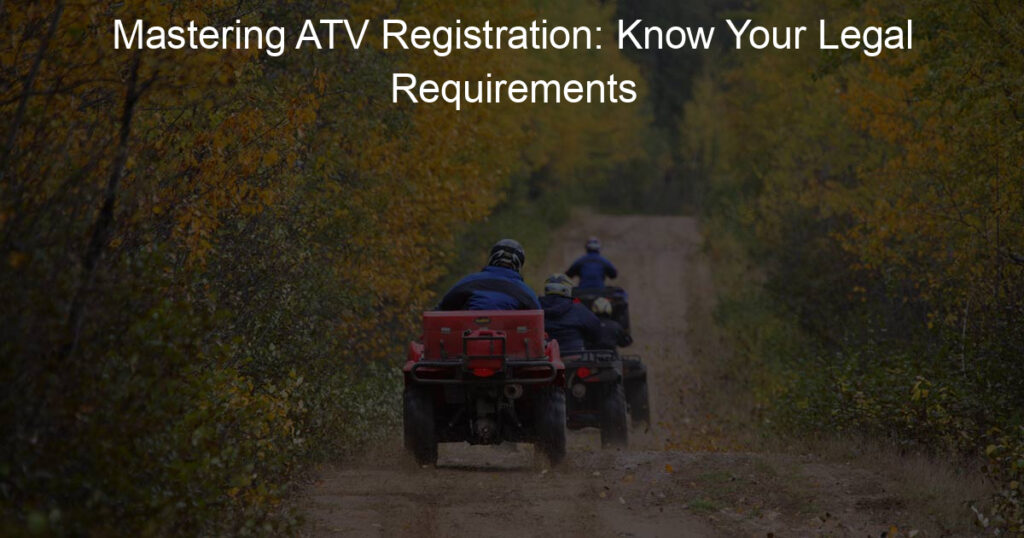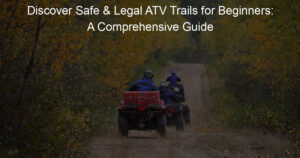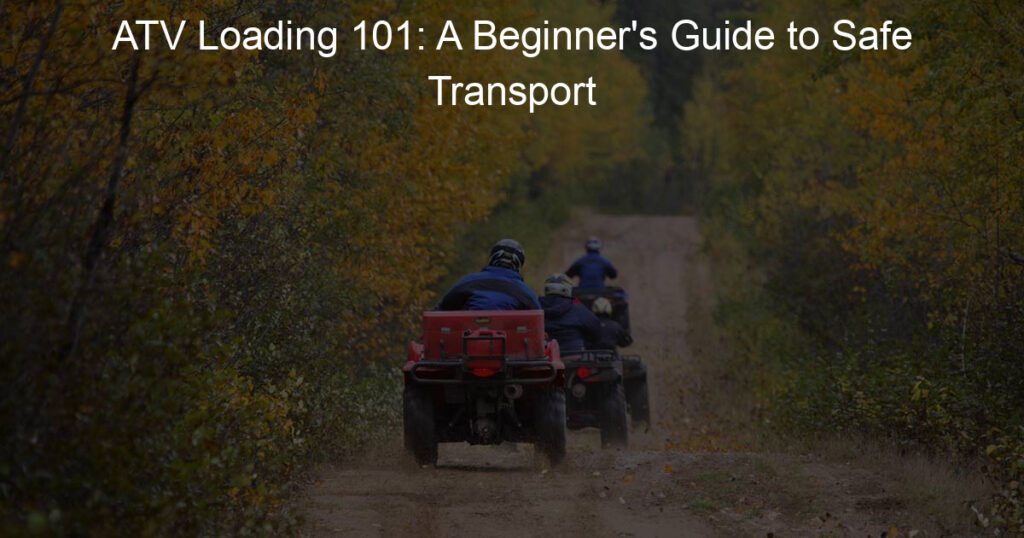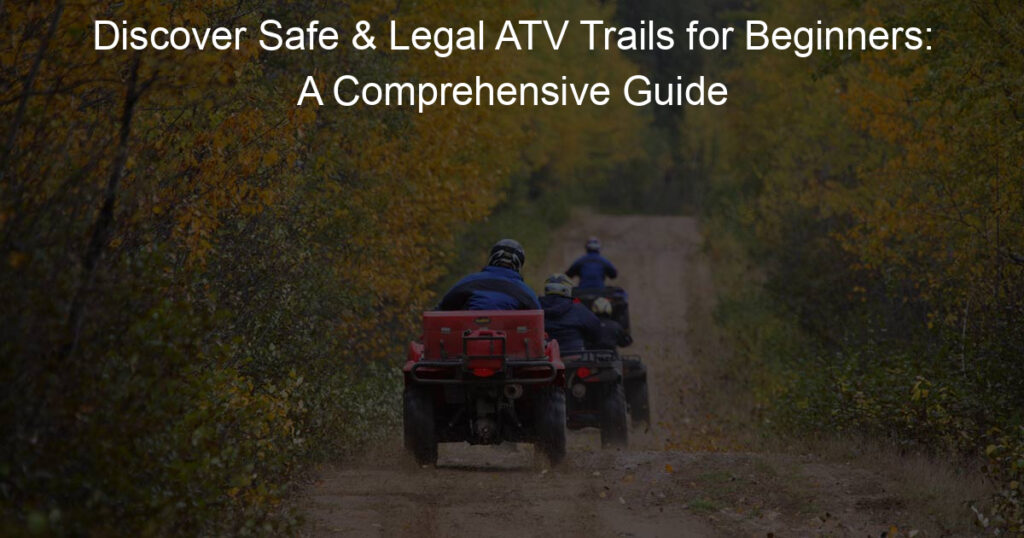
Introduction to ATV Registration Process
Registering your All-Terrain Vehicle (ATV) is a crucial step that every ATV owner should take seriously. Not only does it ensure that you are abiding by the law, but it also provides you with certain protections and privileges. In this section, we will delve into the importance of ATV registration and provide an overview of the registration process.
- Understanding the importance of ATV registration
- Overview of the ATV registration process
ATV registration is not just a legal requirement; it’s a key part of responsible ATV ownership. When you register your ATV, you’re essentially making it known to the authorities that you own this vehicle. This can be helpful in various situations, such as if your ATV gets stolen or involved in an accident. Moreover, in many places, having a registered ATV is a prerequisite for using public ATV trails and parks. Thus, registration is a step you cannot afford to skip.
The ATV registration process may vary slightly depending on your location, but generally, it involves a few key steps. First, you need to fill out a registration form, which usually requires information like your name, address, and details about your ATV. Next, you might need to provide proof of ownership, such as a bill of sale or a title. Finally, you’ll need to pay a registration fee. Once all these steps are completed, you’ll receive a registration certificate or a sticker for your ATV.
In the following sections, we will delve deeper into the legal aspects of ATV use, the specific licensing requirements, and the laws governing off-road vehicles. We will also provide a detailed overview of ATV registration and licensing laws, and a step-by-step guide to the ATV registration process. Stay tuned to learn more about how to legally enjoy your ATV.
Legal ATV Use: Understanding the Basics
ATVs, or All-Terrain Vehicles, are a popular choice for outdoor enthusiasts. However, it’s crucial to understand the legalities surrounding their use. In this section, we will define what constitutes legal ATV use and dispel some common misconceptions.
- Defining legal ATV use
Legal ATV use refers to the operation of these vehicles in accordance with local, state, and federal laws. This can include restrictions on where and when you can ride, the need for proper registration and licensing, and adherence to safety regulations. For example, many areas require ATVs to be registered and the operator to have a valid driver’s license. Additionally, some places have specific laws about wearing helmets and other safety gear while riding.
- Common misconceptions about ATV use
There are several misconceptions about ATV use. One common myth is that ATVs can be ridden anywhere. In reality, there are often specific areas where ATV use is allowed, and riding in unauthorized areas can result in fines or other penalties. Another misconception is that ATVs are only for adults. While it’s true that operating an ATV requires a certain level of skill and responsibility, many states have age-specific laws and offer safety courses for younger riders.
In conclusion, understanding the legalities of ATV use is essential for anyone who owns or plans to operate one of these vehicles. Always check with local authorities or a trusted legal advisor if you’re unsure about the laws in your area.
Remember, the goal is not only to enjoy the thrill of riding an ATV, but also to do so responsibly and within the bounds of the law.
ATV Licensing Requirements: What You Need to Know
Understanding the requirements for ATV licensing is crucial for anyone who wishes to operate an All-Terrain Vehicle (ATV). This section will provide you with key insights into the age requirements and documentation needed for ATV licensing. Let’s dive in.
- Age requirements for ATV licensing
In most states, the minimum age for ATV licensing is 16 years. However, some states may allow younger riders to operate an ATV under specific conditions. For instance, they may require the rider to complete a safety course or be supervised by an adult. It’s essential to check the specific age requirements in your state to ensure you are compliant.
- Documentation needed for ATV licensing
Applying for an ATV license requires several documents. Generally, you will need:
- A completed application form
- Proof of ownership (such as a bill of sale or a title)
- Proof of identity (like a driver’s license or passport)
- Proof of age (such as a birth certificate)
Again, the exact documents required may vary from state to state. Always check with your local Department of Motor Vehicles (DMV) or similar agency to ensure you have all the necessary paperwork.
Understanding and meeting these requirements is the first step towards legal ATV operation. Remember, operating an ATV without a proper license can lead to hefty fines and potential legal issues. So, always ensure you are fully compliant with your state’s ATV licensing requirements.
| Requirement | Description |
|---|---|
| Minimum Age | 16 years (may vary by state) |
| Application Form | Completed and signed |
| Proof of Ownership | Bill of sale or title |
| Proof of Identity | Driver’s license or passport |
| Proof of Age | Birth certificate |
Stay informed and stay safe. Happy riding!
Off-road Vehicle Laws: A Comprehensive Guide
Off-road vehicle laws are an essential part of safe and legal ATV operation. This guide will help you understand these laws and why it’s crucial to adhere to them.
Understanding Off-road Vehicle Laws
Off-road vehicle laws are rules and regulations that govern the use of vehicles designed for off-road use, like ATVs. These laws vary from one location to another, but they all aim to ensure safety and protect the environment.
- Defining off-road vehicle laws: Off-road vehicle laws are legal rules that control how and where you can use vehicles like ATVs. These laws cover things like where you can ride, how fast you can go, and what safety equipment you must have. They also include rules about registering and insuring your ATV.
- Importance of adhering to off-road vehicle laws: Following off-road vehicle laws is important for many reasons. First, these laws help keep you and others safe when you’re riding. Second, they protect the environment by limiting where and how ATVs can be used. Finally, if you don’t follow these laws, you could face fines, lose your ATV license, or even have your ATV impounded.
Understanding and following off-road vehicle laws is a key part of being a responsible ATV rider. By knowing the rules and sticking to them, you can enjoy your ATV while also keeping yourself and others safe, and protecting the environment.
Examples of Off-road Vehicle Laws
Let’s take a look at some real-world examples of off-road vehicle laws. We’ll examine the rules in two different states: California and Texas. These case studies will help us understand how these laws vary across the country.
- Case study: Off-road vehicle laws in California
In California, off-road vehicles, also known as All-Terrain Vehicles (ATVs), are governed by the California Department of Parks and Recreation. The state requires all ATVs to be registered and to display a visible identification number. Riding ATVs is permitted in designated areas only, and riders under the age of 18 must wear a helmet. Additionally, it is illegal to operate an ATV under the influence of drugs or alcohol.
Law Details Registration Required for all ATVs Riding Areas Designated areas only Helmets Required for riders under 18 Substance Use Illegal to operate under influence - Case study: Off-road vehicle laws in Texas
In Texas, the off-road vehicle laws are slightly different. While registration is still required, there is no state-wide helmet law. However, many parks and private properties may have their own rules regarding helmet use. It’s also important to note that Texas law prohibits the operation of ATVs on public roads, with a few exceptions for farming and ranching purposes.
Law Details Registration Required for all ATVs Riding Areas Prohibited on public roads, except for farming and ranching purposes Helmets No state-wide law, but may be required by parks or private properties Substance Use Illegal to operate under influence
As you can see, off-road vehicle laws can vary greatly from state to state. It’s crucial for ATV riders to familiarize themselves with the laws in their area to ensure they are riding safely and legally.
ATV Registration Laws: A Detailed Overview
ATV registration laws vary from one place to another. It’s essential to understand these laws to avoid penalties and ensure safe and legal ATV use. This section provides a detailed overview of ATV registration laws and the common penalties for not adhering to them.
- Understanding ATV registration laws
ATV registration laws are rules set by the government to regulate the use of All-Terrain Vehicles (ATVs). These laws are designed to ensure the safety of ATV riders and the general public. They also help to protect the environment from potential damage caused by ATV use.
Registration laws typically require ATV owners to register their vehicles with a relevant government agency. This process usually involves paying a fee, providing proof of ownership, and sometimes, passing a safety inspection. Once registered, the ATV is usually issued a registration number or sticker, which must be displayed on the vehicle at all times.
It’s important to note that registration laws can vary greatly depending on where you live. For example, some places may require ATVs to be registered even if they are only used on private property, while others may only require registration for ATVs used on public lands. Therefore, it’s crucial to research and understand the specific registration laws in your area.
- Common penalties for not adhering to ATV registration laws
Failure to adhere to ATV registration laws can result in a variety of penalties. These may include fines, confiscation of the ATV, and in some cases, even jail time.
For example, in some jurisdictions, the fine for operating an unregistered ATV can be several hundred dollars. Repeat offenders may face even higher fines, and their ATVs may be impounded until they can provide proof of registration.
In more severe cases, such as when an unregistered ATV is involved in an accident or used in the commission of a crime, the penalties can be much more severe. This could include significant fines, jail time, and the permanent loss of the ATV.
Remember, the best way to avoid these penalties is to understand and comply with your local ATV registration laws. This not only helps to keep you and others safe, but it also ensures that you can enjoy your ATV without the worry of legal repercussions.
ATV Licensing Laws: What You Must Adhere To
Understanding the laws surrounding ATV licensing is crucial for every ATV owner. These laws are in place to ensure the safety of riders and the general public. In this section, we will delve into the key aspects of ATV licensing laws and the consequences of violating them.
- Key aspects of ATV licensing laws
ATV licensing laws vary from state to state, but there are some common aspects that you should be aware of:
- Age Requirement: Most states require the ATV rider to be at least 16 years old to apply for a license. However, some states allow younger riders to operate ATVs under adult supervision.
- Training Course: Many states require ATV riders to complete a safety training course before they can be licensed. This course typically covers basic ATV operation, safety rules, and emergency procedures.
- Insurance: ATV owners are often required to carry liability insurance. This insurance covers damages or injuries that may occur while operating the ATV.
- Helmet Laws: In many states, ATV riders are required to wear a helmet at all times when riding. This law is enforced to protect riders from serious head injuries.
- Consequences of violating ATV licensing laws
Violating ATV licensing laws can lead to serious consequences. Here are some potential outcomes of non-compliance:
- Fines: If you are caught riding an ATV without a valid license, you could be fined. The amount of the fine varies by state, but it can be quite substantial.
- Suspension of License: Repeat offenders may have their ATV license suspended for a certain period. This means you would not be allowed to operate an ATV during this time.
- Confiscation of ATV: In some severe cases, your ATV could be confiscated if you are found violating licensing laws.
- Legal Consequences: If your violation leads to an accident causing damage or injury, you could face legal consequences, including potential jail time.
Remember, ATV licensing laws are there for your safety and the safety of others. Always adhere to these laws to enjoy a safe and legal ATV riding experience.
ATV Legal Guidelines: Ensuring Compliance
When it comes to riding All-Terrain Vehicles (ATVs), it’s not just about the thrill and adventure. It’s also about following the rules and regulations set by the law. In this section, we will explore the legal guidelines for ATV use and the importance of adhering to these rules.
- Overview of ATV legal guidelines
ATV legal guidelines vary from one place to another. However, there are common rules that most regions follow. These include age restrictions, helmet requirements, and rules about where you can ride your ATV. For instance, in many areas, riders under the age of 16 are required to be supervised by an adult. Also, most places require riders to wear a helmet for safety purposes. Lastly, ATVs are typically not allowed on public roads, and are only permitted on designated trails and private property.
It’s important to note that these are just general guidelines. The specific rules can vary greatly depending on your location. Therefore, it’s crucial to check with your local law enforcement agency or ATV club to get accurate information about the legal guidelines in your area.
- Importance of following ATV legal guidelines
Following ATV legal guidelines is not just about avoiding fines or penalties. It’s about ensuring your safety and the safety of others. ATVs can be dangerous if not used properly. In fact, according to a report by the Consumer Product Safety Commission, there were an estimated 93,800 ATV-related injuries in the United States in 2017 alone. Of these, about 26% were children under the age of 16.
By following the legal guidelines, you can significantly reduce the risk of accidents and injuries. For instance, wearing a helmet can protect you from serious head injuries in case of an accident. Similarly, by adhering to age restrictions and supervision requirements, you can ensure that young riders are not put in dangerous situations.
In conclusion, ATV legal guidelines are there for a reason. They are designed to keep you safe and to ensure that everyone can enjoy the thrill of ATV riding without unnecessary risks. So, make sure to familiarize yourself with these rules and follow them at all times.
Requirements for ATV Registration: A Step-by-Step Guide
Registering your All-Terrain Vehicle (ATV) is an important step in ensuring your vehicle is legal and ready for use. Here’s a simple, step-by-step guide to help you through the process.
- Step 1: Gathering necessary documents
- Step 2: Filling out the registration form
- Step 3: Paying the registration fee
Before you begin the registration process, you’ll need to gather some important documents. These typically include proof of ownership (like a bill of sale or a title), proof of insurance, and your driver’s license. Make sure all documents are current and valid. This step is crucial as it verifies your ownership and ensures you meet the necessary legal requirements.
Once you have all your documents ready, the next step is to fill out the registration form. This form will ask for details about your ATV, such as the make, model, year, and Vehicle Identification Number (VIN). Be sure to fill out all sections accurately to avoid any delays in the registration process. Remember, honesty is the best policy when it comes to legal matters.
After filling out the form, you’ll need to pay a registration fee. The cost can vary depending on your location, so it’s a good idea to check with your local Department of Motor Vehicles (DMV) for the exact amount. Once you’ve paid the fee, you’re one step closer to hitting the trails with your ATV!
Registration is a necessary part of owning an ATV. It not only keeps you on the right side of the law but also ensures your vehicle is recognized by the authorities. By following these steps, you’ll be able to navigate the registration process with ease.
| Step | Description |
|---|---|
| 1 | Gather necessary documents including proof of ownership, insurance, and driver’s license. |
| 2 | Fill out the registration form accurately with details about your ATV. |
| 3 | Pay the registration fee as determined by your local DMV. |
Remember, each step is crucial in ensuring your ATV is legally registered and ready for use. Happy riding!
ATV Licensing Process: What to Expect
Obtaining a license for your All-Terrain Vehicle (ATV) is a crucial step in ensuring legal and safe operation. This process may seem daunting, but with the right knowledge, it becomes manageable and straightforward. This section will guide you through the ATV licensing process and help you understand the common challenges you might face and how to overcome them.
- Understanding the ATV Licensing Process
The ATV licensing process varies from state to state, but generally, it involves several steps. Firstly, you need to complete an ATV safety course. This course educates you on the basics of operating an ATV, safety measures, and rules of the road. Upon completion, you will receive a certificate, which is a prerequisite for the licensing process.
Next, you will need to fill out an application form, providing personal details and information about your ATV. This application, along with the safety course certificate and a small fee, is submitted to the Department of Motor Vehicles (DMV) or a similar authority in your state. After processing, which can take a few weeks, you will receive your ATV license.
- Common Challenges in the ATV Licensing Process and How to Overcome Them
While the ATV licensing process is generally straightforward, you may encounter a few challenges. One common issue is understanding the different laws and regulations in each state. Some states require ATVs to be registered and licensed, while others do not. To overcome this, it’s essential to research and understand the specific ATV laws in your state.
Another challenge could be passing the ATV safety course. This course can be challenging for beginners, but with adequate preparation and practice, you can pass it. There are numerous online resources and practice tests available to help you prepare.
Lastly, the processing time for the license can be lengthy, leading to frustration. However, understanding that this is a normal part of the process and planning accordingly can help alleviate this stress.
In conclusion, the ATV licensing process involves several steps, including completing a safety course, filling out an application, and waiting for processing. While there can be challenges, understanding these ahead of time and preparing for them can make the process smoother and less stressful.
Legal Requirements for Off-road Vehicles: A Comprehensive Guide
Understanding the legal requirements for off-road vehicles and adhering to these laws is crucial for every ATV rider. This guide will provide you with a comprehensive overview of these requirements.
- Understanding the legal requirements for off-road vehicles
Off-road vehicles, also known as All-Terrain Vehicles (ATVs), are subject to specific laws and regulations. These laws vary by state and are designed to ensure the safety of riders and the protection of the environment.
Some of the most common legal requirements for off-road vehicles include:
| Legal Requirement | Description |
|---|---|
| Registration | All ATVs must be registered with the state’s Department of Motor Vehicles (DMV). |
| License | Riders must have a valid driver’s license or ATV operator’s permit. |
| Insurance | ATVs must be insured to cover potential damages or injuries. |
| Safety Equipment | Riders are required to wear safety gear, including helmets and protective clothing. |
- Importance of adhering to these legal requirements
Adhering to the legal requirements for off-road vehicles is not just about following the law. It’s about ensuring your safety and the safety of others. Failure to comply with these laws can lead to hefty fines, suspension of your driving privileges, and even imprisonment.
Moreover, respecting these laws helps protect the environment. Off-road vehicles can cause significant damage to natural habitats if not used responsibly. By following the legal requirements, you are doing your part to preserve nature for future generations.
In conclusion, understanding and adhering to the legal requirements for off-road vehicles is a responsibility that every ATV rider should take seriously. It ensures not only your safety but also the well-being of the environment and others around you.














